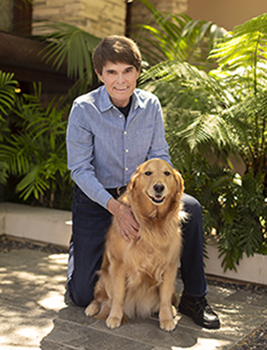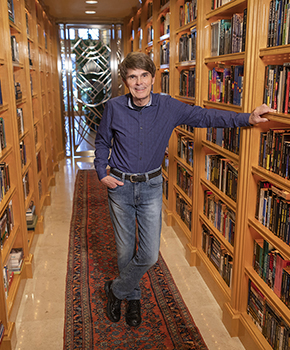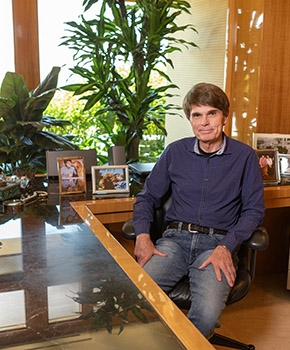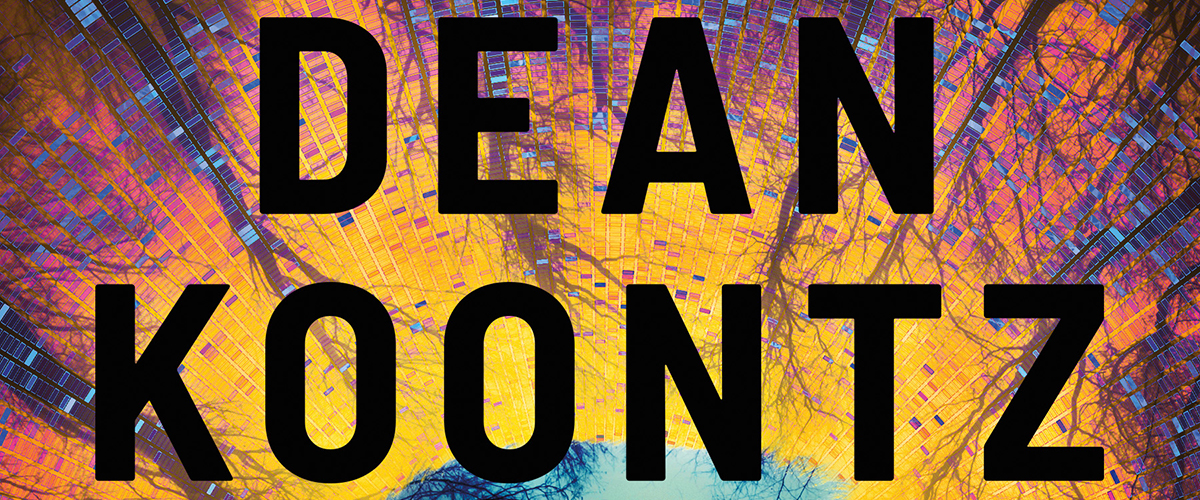

Features Dean Koontz
Good and Evil, Golden Retrievers, and a Matter of Perspective
A Conversation with Thriller Legend Dean Koontz
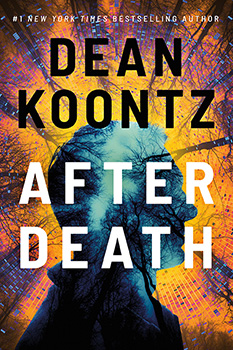 By K.L. Romo
By K.L. Romo
Bestselling author Dean Koontz has written more than 105 novels and has sold over 500 million books. As hard as it is to imagine, that is HALF. A. BILLION! He’s a quintessential genre-bender; his books are filled with suspense, horror, sci-fi, and tech innovations. Why would he limit himself to one or two?
In his most recent thriller, AFTER DEATH, Koontz explores what it would be like to have the extraordinary power of a human web interface—The Singularity—and how it could change the world as we know it.
Michael Mace died in a biohazard accident but came back to life with the ability to access and manipulate technology. While using his newfound power to protect a woman and her teen son, he discovers that a ruthless psychopathic federal agent wants him dead. Who will live, and who will die?
Here, The Big Thrill caught up with Koontz about writing villains, the importance of dogs in his life, his charity work, and being a closet comedian.
I really enjoyed AFTER DEATH. At one point, you stated that the book contains one of the most disturbing villains you’ve ever written or written in a while.
Well, you never know when you start a book, and you see who the main antagonist is going to be. You never know how they’re going to evolve and just how dark they’re going to get. This book has a number of antagonists. The street gang is formidable, but Calaphas, the federal agent, just kept getting darker and darker. I thought this was not somebody you wanted to cross or meet in a dark alleyway—or actually on a sunny street.
Since you didn’t know how dark the character would get until after you wrote him, does that mean you’re more of a pantser, with your characters gaining their own momentum as you write?
I stopped using outlines with the first book I ever wrote. I start with a premise and let the characters guide me, and it’s worked much better for me that way over the years. It keeps everything fresh and natural to me.
I’m a writer myself, but I’m just starting out. I know the basic story and have a general idea of what will happen, but the characters run away with the story. It sounds like you learn about your characters and what they think (and will do) as you write them?
They take you places you didn’t see. I know in AFTER DEATH, not to give much of anything away, but very early in the book, you meet the lead character on page one, and he goes into a lawyer’s office, where a lawyer is meeting with some very bad people. There’s a lot of cash lying on the kitchen counter—he appears to be unarmed, and they’re heavily armed—and he says, which was kind of a surprise to me, he says, ‘I’ll just take $500,000 of that; you can keep the rest.’ It bamboozles them.
When he said that, I thought: Okay, now I’ve got this guy, and he’s gonna surprise me step by step because I didn’t know he would say that. With that level of confidence, I knew we had something going on here that would make him evolve in ways that I would want to keep learning about him.
Right off the bat, that tells you he’s a good guy. He didn’t try to hurt them and didn’t take all the money. It was fascinating how you combined the techno aspect into his brain. Do you think that’s going to happen eventually? Or something like it?
Well, for, I guess, 30 years, a lot of tech-oriented people and people hoping that they can be made immortal in our lifetime—people like Ray Kurzweil—they’ve been hoping for The Singularity, more than hoping; they’re certain that meshing of human and machine will happen, and it will lead to one form of immortality or another. I’m not so sure. But I’ve been reading about it for a long time, and I thought, if this ever were to happen, it’s not going to make each of us super geniuses. And it won’t make us superheroes, which is some of what these people think will happen. I’ve even seen figures our intelligence will be increased a thousand-fold. I’m sorry, but I don’t believe that for a second. It’s a fantasy.
I thought about this for quite a long time and wondered, what is likely to be the benefit of some degree of machine-human interaction? And that’s what I came up with for the lead character: he has an ability that gives him an advantage, but he’s not going to live forever. He could be shot dead tomorrow. It doesn’t give him everything he needs.
And once I thought it through, I thought, well, here’s something that can conceivably happen—to become intimately connected with the internet and anything on it. But then what would that mean? I didn’t want AFTER DEATH to become a sci-fi novel. I wanted to keep the story in contemporary suspense. But because everybody’s been talking about The Singularity for so many years, you can do that and still carry it into a futuristic realm.
So that’s what it’s truly called, The Singularity? In real life?
My problem with AI is whatever it is, it is not a creature with a soul. Therefore, it is a creature for whom good and evil will have no meaning. It may decide, on its own accord, what is good and what is evil.Yeah, that’s what they call it. The moment of human and machine interaction; it tends to mean slightly different things for different people. But it’s when our technology reaches a point, a turning point, or a breakthrough point, where nothing will ever be the same again, and we will take quantum leaps in technology almost weekly. And it either happens or it won’t.
It’s sort of like the issue of AI. People think it will be all glory. My first thought about AI is that AI may get intelligent in a way we don’t think of because it’s going to be as alien to us as any creature from another world. And so, we can’t grasp how it will think, how it will reason, and what conclusions it will come to. So, it could be as terrible as it could be advantageous. My problem with AI is whatever it is, it is not a creature with a soul. Therefore, it is a creature for whom good and evil will have no meaning. It may decide, on its own accord, what is good and what is evil. Then we’re in deep trouble.
How has your writing changed over the years? Or has it?
It changed rather dramatically. It’s a learning process. I started in the days when mass-market paperbacks were king. What was great about those days was you could fail over and over again, and it wasn’t such a consequential thing for a publisher. They didn’t really know whether some of what you published had failed because they couldn’t track sales for other publishers quite like they can now. If you were an up-and-coming writer, you could do a lot of experimenting, fall on your face, and go on.
Now, it’s much more difficult because they’re right on top of what your sales are. In three books, and you’re not clicking yet? They often say, ‘Well, we’ll move on.’ So, it’s harder to experiment with things than in my day when I started. But I’ve always kept that up. I think it’s helped me because it led to crossing genres, which when I first did that, really nobody was doing it. I used to get in conflict with publishers who didn’t like it. But I kept at it, and gradually, it worked. So, that changed what I did.
And I came, at some point, after a number of years, to the conclusion that what drove good fiction was character, not so much plot. You need a good plot. You need events that move the story along, and they must be gripping. But at the same time, if those characters don’t intrigue you, or better yet, enchant you, then the greatest plot in the world might work for one book, but then you’re always going to be the plot guy, and it’s not that easy to come up with great plots over and over again. There’s an infinite number of characters in the world to draw your story from.
I’ve learned you’re a Golden Retriever fan.
Got a beautiful Golden Retriever right here, right now, watching me, wondering why am I not giving her a belly rub? She knows she’ll get them; she always gets what she wants. They’ve been such an amazing addition to our lives. My greatest regret in life is that I waited so long to get our first dog. We’ve had three Goldens now, and each one has been a unique personality, yet all have that wonderful Golden love. They’re love sponges; they want to give it and get it. They’re great clowns, so the day is full of laughter. I should have just had one 30 or 40 years before I did.
Speaking about dogs, could you tell me a little about your charity work?
Well, most of it isn’t related to dogs, but a big share, probably half, is. We got interested 30-some years ago in a group called Canine Companions for Independence, which produces assistance dogs at no cost for people with disabilities—paraplegic, quadriplegic—they started some years ago training dogs for autistic children. It’s just astonishing to watch an autistic child with behavioral problems get a socializing dog—what they’re called—and the behavioral problems go away. The child is calm and not problematic. It’s just astounding, and it’s from that relationship.
That’s really how we ended up getting dogs of our own because once in a while, they have a dog that fails out after twenty-some months of training and needs a home. That’s been a great boon in our lives. We went away—this goes back many years—to the CCI event for three days—over a weekend—and encountered probably 200 or more people with severe disabilities. I didn’t meet one who complained about their situation or who was in any way downbeat. They were all upbeat. They were all getting their dogs or had dogs for some time.
I was the head of a writer’s organization at that time, and I was getting complaints and a lot of whining from the members. I came home and resigned, and I said, ‘I was someplace this weekend where people had real problems to complain about, and not one of them did.’ It was eye-opening for me; I stopped complaining myself after that weekend. It brought home what real problems were.
I have to say, after reading through your website and essays, I think you’re hilarious. Have you ever considered becoming a stand-up comedian?
My wife says that I’m a frustrated stand-up comedian. That’s what I would have wanted to be. Everything in life is funny when enough time passes, and you can look at it a little calmly.
I have a comic novel coming out from Thomas & Mercer. It’s called The Bad Weather Friend, which comes out in January [2024]. It’s my agent’s favorite novel I’ve written. I was a little concerned because, while it is suspenseful, it’s also very funny, and I wasn’t sure what the reaction would be.
You’re already a genre-bender anyway. Why not throw some comedy in there, too?
I can remember back when I wrote a book called Lightning. My publisher at that time was adamant that the humor in that book would destroy my career. And she said, ‘You cannot have humor in a suspense novel.’ We argued about this for months. I finally said, ‘Either reject it or accept it,’ and she accepted it. And it went on, at that time, to be the most successful book I ever had.
Her prejudice against humor in suspense remains; she didn’t give up on the issue. There are a lot of rules and things that we’re told are common wisdom, but they’re just common. They aren’t wise at all.
It’s all subjective anyway, so if a reader enjoys it, that’s the whole point. I know you’re very interested in landscape design. What are your favorite yard plants and trees?
Well, we’ve gone through some changes in that regard because two years ago, we moved from right on the coast to somewhat inland. It’s 12 minutes from there. But this inland is just different territory. I love the neighborhood; it’s really pretty here. It’s like living in a forest. But it does get hotter in the summer and colder in the winter.
I love California pepper trees. We have a lot of flowers, and my wife is the same on this issue—we don’t like pale colors. If we’re going to have flowers, they must be red, purple, and vibrant colors.
I have my opinions about architecture and landscape design. And we’re building a house that’s going slow because of the supply chain mess. All of that is a great deal of fun, and I enjoy it. I don’t have a lot of hobbies. I collect certain things, but not to the extent that it fills up a lot of my time. But something like interior design, architecture, landscape architecture, that’s enjoyable because you can build an environment that is peaceful and beautiful, wherever you can make it that way.
And it really reflects well on your ability to create, I think. When you surround yourself with things you think are beautiful, it puts you in a state of mental rest. A lot of our creative things come to you that way. I’m quite convinced of it because it’s worked for me.
- The Big Thrill Recommends: WHAT YOU LEAVE BEHIND by Wanda M. Morris - June 27, 2024
- Sally Hepworth - May 10, 2024
- Katherine Ramsland - April 25, 2024

